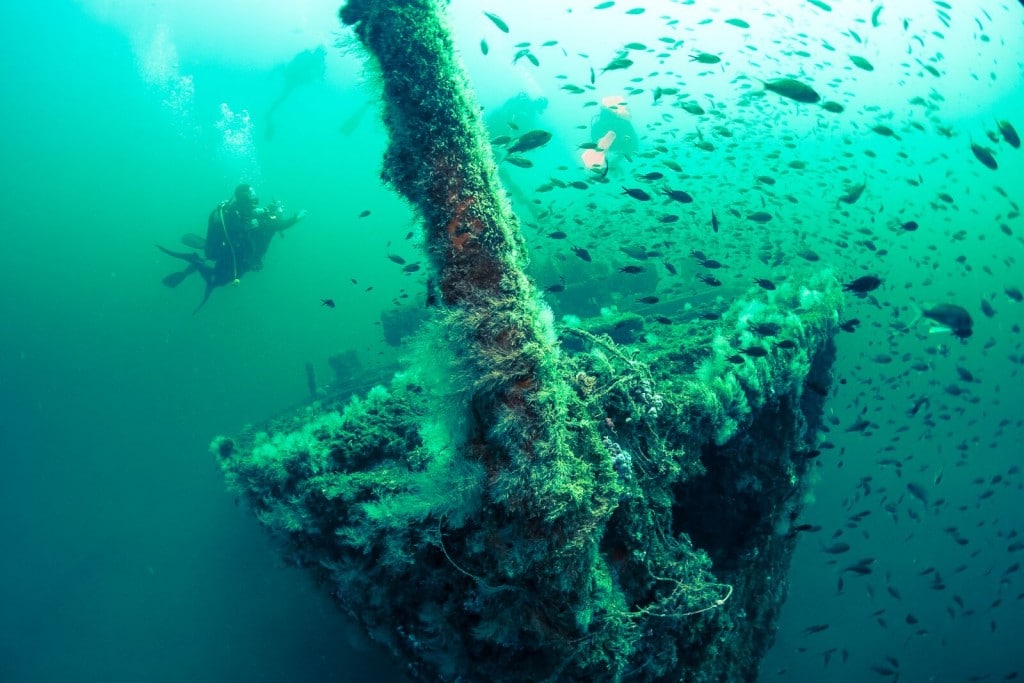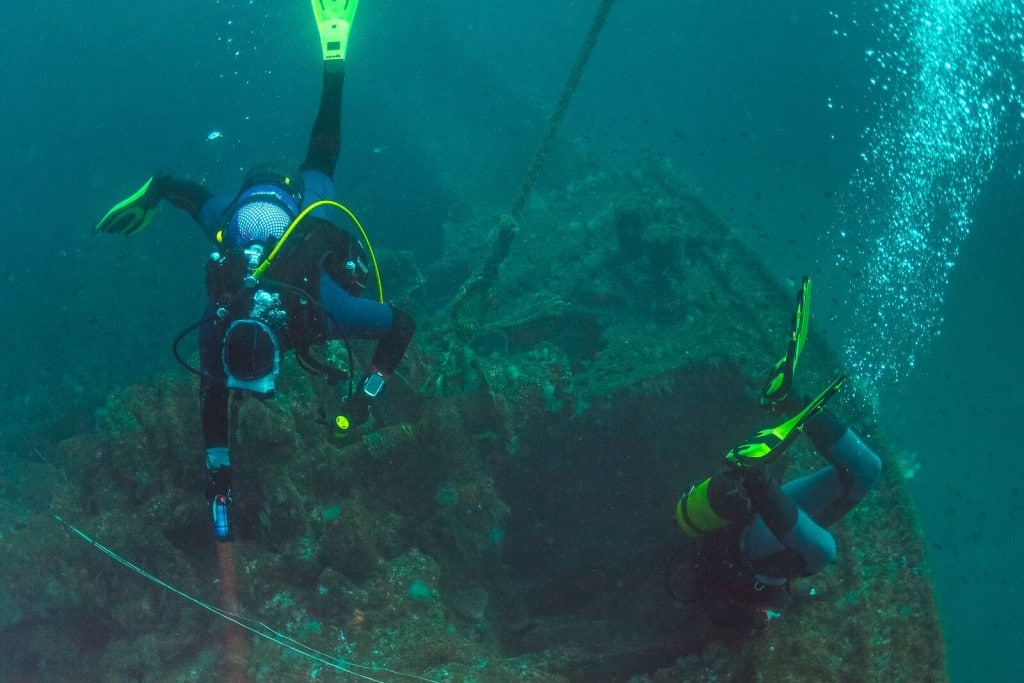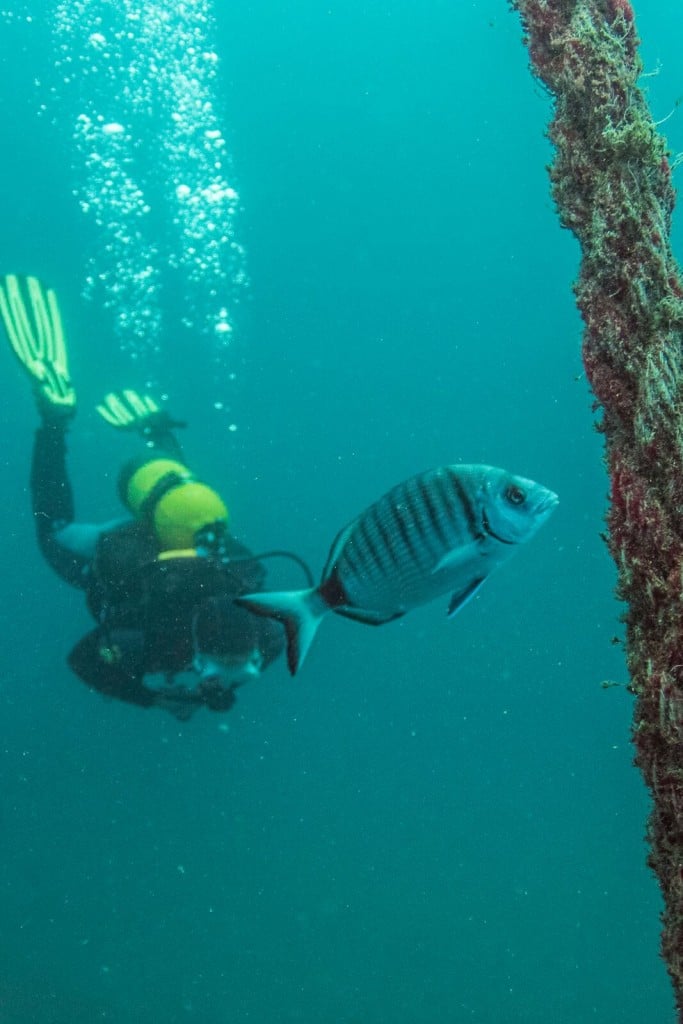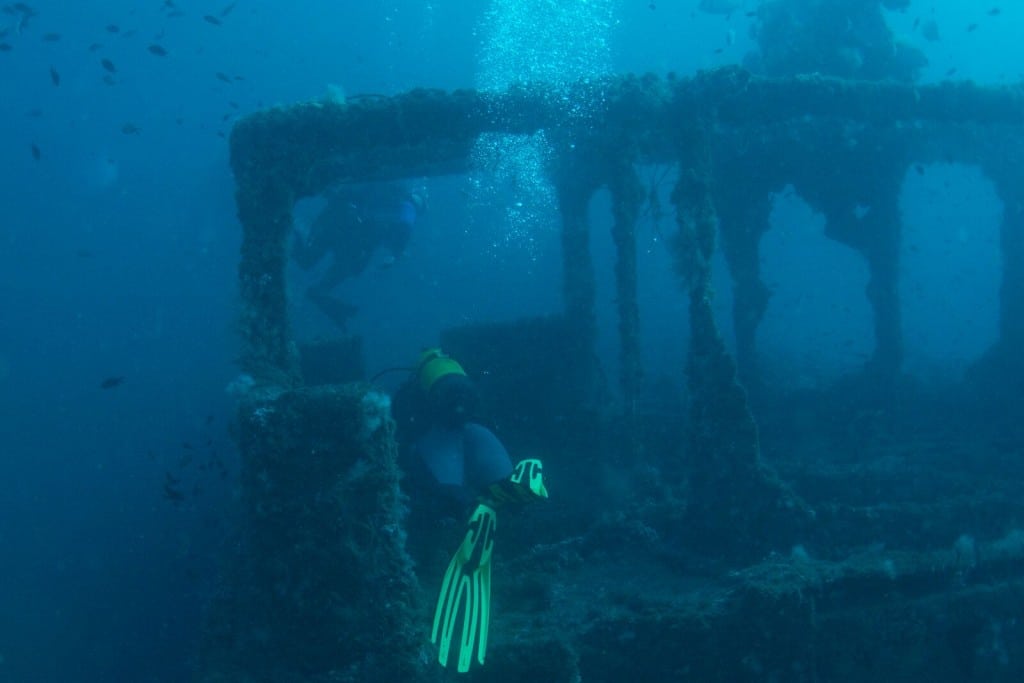News
The wreck of the Isla Gomera or El Naranjito

Just getting started with wreck diving? Or looking for a new challenge?
This is a fantastic and easily accessible wreck dive to build up your experience and confidence, known locally as El Naranjito due to its cargo of oranges carried on the fatal voyage in April 1946. Whilst heading to Barcelona from Cartagena the cargo shifted in a violent storm, but luckily the majority of the crew managed to swim ashore despite the cold water. Unfortunately the Chief Engineer’s wife did not survive. Oranges littered the shoreline for weeks and provided easy pickings for the locals.

Originally named the Nadir and launched in 1919 from Cadiz in Spain, it had a single steam engine. The 51m long vessel now sits on a sandy bottom heeled slightly to Starboard. The bottom of the stern is at 45mwd, whilst the bow sits at 42mwd. The wreck is in excellent condition and the engine room and holds make an enjoyable starter for anyone wanting wreck penetration. The focastle deck is around 28mwd.
 I have dived this wreck at least 25 times during the past 2 years and it never fails to excite. The visibility is usually excellent, but sometimes there is a current running as you descend the buoy line to just aft of the bow. On reaching the deck area it is easy to navigate around the remains of the deck machinery. Careful observation will reveal the large Congers who live in the “catholes” where once the hawsers used to run. Patience is needed to get a good photograph as they are shy!
I have dived this wreck at least 25 times during the past 2 years and it never fails to excite. The visibility is usually excellent, but sometimes there is a current running as you descend the buoy line to just aft of the bow. On reaching the deck area it is easy to navigate around the remains of the deck machinery. Careful observation will reveal the large Congers who live in the “catholes” where once the hawsers used to run. Patience is needed to get a good photograph as they are shy!
The wreck is also home to large Morays, which have made the engine room their own. Depending on the time of year, shoals of Dentex, Barracuda and Amberjacks can be seen hunting their prey of Sardine and Anchovy just off the deck area. I have also been lucky several times and managed to spot lone Sunfish off in the blue. Smaller subjects can be found, even to macro levels, if you can spot the tiny nudibranchs or the Spiny Rockfish that abound on the deck area.
To make the best of this dive, good planning is needed. Stay on the deck area and you can dive on air, but for more ambitious dives Nitrox or Trimix should be considered. A good level of experience is required as this dive is in open sea; having said that, the local dive operators know their business and are very capable and dive this location regularly.

In summary, this is a must if you are diving in the area.
Location
Cabo de Palos, Murcia, Spain.
Dive Operators
Divers Cabo de Palos – Tel: +34 687802891 – info@diverscabodepalos.com
Centro de Buceo Naranjito – Tel +34 968564836 – naranjitobuceo@naranjitobuceo.com
Mangamar Dive Centre – Tel +34 968100860 – info@mangamar.es
Gear News
Introducing the TR-80, IR-50 and CS-30 Regulators from DYNAMICNORD

Whether you are a beginner or a professional diver – with the three new main regulators from DYNAMICNORD, everyone will find their favourite regulator. They all look super stylish.
Excellent performance with the TR-80
Quality and performance are the be-all and end-all for regulators. It is not for nothing that the TR stands for Tec Reg. The innovative design of the TR-80 guarantees absolute reliability – even in ice-cold waters.

Perfect breathing effort at 0.8 J/l / certified for diving in waters below 10 degrees / structural design made of solid brass for best cold protection / membrane-compensated design with dry seal of the first stage / reduced exhalation effort thanks to optimized exhalation membrane and bubble deflector / adjustable Venturi (dive/predive) and adjustment knob for individual inhalation comfort / innovative design of the front cover prevents free-flow in strong currents or when diving with scooters / design made of sandblasted brass, matt chrome finish / 2 HP and 4 LP outlets / mouthpiece made of high-quality, anti-allergic silicone for maximum comfort.


Amazing underwater adventures with the IR-50
The IR-50 is the top regulator for advanced and experienced divers. Natural breathing is the essence of this regulator.

Ideal breathing effort at 0.8 J/l /certified for diving in waters below 10 degrees / compensated membrane / adjustable venturi (dive/predive) and adjustment knob for individual inhalation comfort/ outlet valve and deflector for minimum exhalation effort and reduction of bubbles on the face / design made of sandblasted brass, matt chrome finish / 2 HP and 4 NP outlets / mouthpiece made of high-quality, anti-allergic silicone for maximum comfort.


The Workhorse – our CS-30
For diving centres and diving beginners – the workhorse stands for strong construction, reliability and robustness. Perfect for your training.

Optimal breathing effort at 0.8 J/l /recommended for diving in waters above 10 degrees / non-compensated piston / adjustable venturi (dive/predive) / outlet valve and deflector for minimum exhalation effort and reduction of bubbles on the face / design made of sandblasted brass, matt chrome finish / 1 HP and 3 NP outlets / mouthpiece made of high-quality, anti-allergic silicone for maximum comfort.


Octopus OP-30
The OP-30 is the ideal addition to all DYNAMICNORD regulators. It is identical in construction to the CS-30.

The TR-80, IR-50, CS-30 (DIN & INT) regulators and the Octopus OP-30 are available from DYNAMICNORD dealers and in the online store.
DYNAMICNORD – Your Outdoor Companion.
Marine Life & Conservation
Paul Watson Released as Denmark Blocks Japan’s Extradition Bid

Renowned anti-whaling activist Paul Watson has been released from custody in Greenland after spending five months in detention. Denmark’s Justice Ministry rejected Japan’s request for his extradition, citing insufficient guarantees that his time already served in custody would be credited against any potential sentence.
The 74-year-old Canadian-American was arrested on July 21 in Nuuk, Greenland’s capital, when his ship docked to refuel. His arrest was based on a 2012 Japanese warrant related to a 2010 encounter in Antarctic waters. Japan alleged Watson obstructed operations and caused damage to a whaling research ship during efforts to disrupt illegal whaling. Watson has consistently denied these claims, maintaining his commitment to marine conservation.
Denmark, which oversees extradition matters for Greenland, concluded that while the legal conditions for extradition were met, the lack of assurances from Japan regarding time-served credit made extradition untenable.
In a video shared by his foundation, Watson expressed gratitude and relief, saying, “After five months, it’s good to be out… and good to know they’re not sending me to Japan.” He added that the most difficult part of his time in custody was being separated from his two young sons.
Watson is a pioneering figure in marine conservation, known for founding the Captain Paul Watson Foundation in 2022 after decades of activism with the Sea Shepherd Conservation Society. His bold efforts to defend marine life have earned him widespread support, including from celebrities and conservationists. His work has also been featured in the acclaimed reality TV series Whale Wars.
Watson’s lawyer, Jonas Christoffersen, praised the decision, stating, “We are happy and relieved that Paul Watson is now free.” He added that Watson is eager to reunite with his family and continue his vital work.
The arrest occurred while Watson’s vessel, the M/Y John Paul DeJoria, was en route to the North Pacific with a team of 26 volunteers to intercept a Japanese whaling ship. His foundation described the arrest as politically motivated and emphasized that Watson’s actions were focused on ending illegal whaling practices.
Japan resumed commercial whaling in 2019 after leaving the International Whaling Commission, asserting that whale meat is a cultural tradition. Conservationists, however, continue to challenge these practices, highlighting their impact on marine ecosystems.
Despite the challenges, Watson remains steadfast in his mission to protect marine life and bring attention to whaling practices. His dedication to ocean conservation has made him a globally respected advocate for the environment.
-

 News2 months ago
News2 months agoIconic SS United States to become the World’s Largest Artificial Reef
-

 News3 months ago
News3 months agoBook Review – 52 Assignments: Underwater Photography
-

 Gear News3 months ago
Gear News3 months agoDYNAMICNORD – New German diving brand enters the British market
-

 News3 months ago
News3 months agoExploring Cenote El Pit: A Diver’s Dream
-

 Gear News3 months ago
Gear News3 months agoTry BARE drysuits (and maybe even win one!) this Friday with Sea & Sea at North West Dive Fest
-

 Marine Life & Conservation3 months ago
Marine Life & Conservation3 months agoBook Review: Coral Triangle Cameos
-

 Blogs2 months ago
Blogs2 months agoDive the Egyptian Red Sea this Autumn with Regaldive
-

 News3 months ago
News3 months ago2024 Ocean Art Underwater Photo Competition Announced















